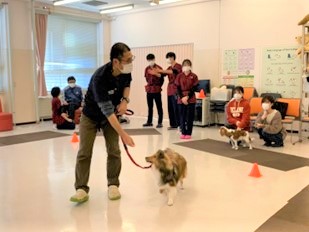Dog training classes held regularly at the Department of Veterinary Nursing, Rakuno Gakuen University ~Puppy class, Junior class, and Adult class~
掲載日:2022.12.15
The Department of Veterinary Nursing (VN) offers dog training classes for general owners, which are managed by VN students and faculties. There are 3 courses in it, Puppy Class, Junior Class, and Adult Class. Puppy classes are for 7~8-week-old puppies during the dog’s socialization period. Junior classes are for young dogs from 3 months of age who have missed the socialization period (3 weeks~3 months). Adult classes are for dogs over 6 months old. The contents of the puppy class are 1) how to communicate with other dogs and owners, 2) acclimatization to people, new environments, sounds, and objects, 3) obedience training, 4) acclimatization to the hospital situation and handling there, 5) habituation and daily maintenance, and 6) playing correctly, etc. The junior class mainly focuses on obedience training and incorporates elements of acclimatization performed in the puppy class. In the adult course, training is mainly focused on obedience training.
These training classes are in high demand and are popular with more than 30 pairs of owners and dogs participating each time. The puppy class offers a learning opportunity for the correct behavior and rules for living with people during the socialization period. Taking puppy classes can prevent many dogs from having toilet problems, feeling anxiety, and fear of other dogs or people other than the owner, or the surrounding environment, which are frequent problem behaviors. In addition, learning the correct way to play can prevent arousal and hyperexcitement. Although the junior class dogs have passed the socialization period, it is not completely incapable of learning socialization, and there is still room for acclimatization. There is a reason for the age classification; the body size of dogs is diverse according to the breeds. Therefore, it is important to start puppy classes at an early age, when they are still small and less likely to be seriously injured while playing. At the age of the junior class when the difference in body size becomes apparent, we take care of the difference and add the essence of socialization to the training. The benefit of using the dog training classes where other dogs and their owners gather together include an increase in motivation of training for both dogs and owners, and sharing various solution examples to problems.
While such a dog training class that improves the relationship between people and pets is available, the awareness of general pet owners has not yet reached to the ideal level. The reasons are the limited number of training classes available, and that many owners still hesitate to attend them. We hope that our activities facilitate the uptake of dog training classes at many more animal hospitals. We also believe that our activities have great significance in changing pet owners’ perception to attend dog training classes more easily.
These days, I have been concerned that many dog owners conduct training in the wrong way which they learned from social media such as YouTube. Recently, the recognition of puppy classes has increased, and I have an impression that the number of owners who wish to take their dogs to the classes. I hope that many veterinary clinics offer puppy classes to the owners. There seems to be an inappropriate puppy class with old-type punishment training, and I sincerely hope that owners choose a classroom with the correct knowledge. I hope all dogs receive the necessary education at an important time in puppy. VN students at Rakuno Gakuen University learn this technique and are expected to have these training courses at animal hospitals in the future.
Department of Veterinary Nursing, Rakuno Gakuen University continues to provide academic knowledge that contributes to good relationships between humans and animals.

